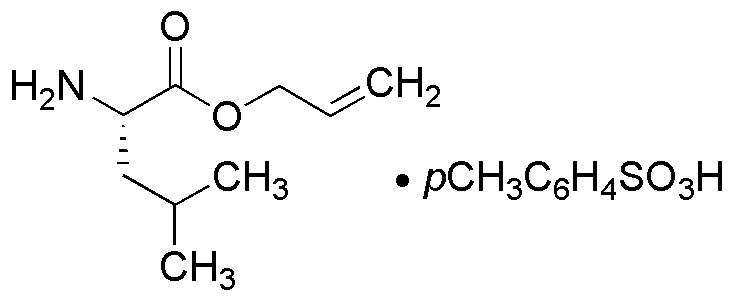L-Leucine allyl ester 4-toluenesulfonate salt is widely utilized in research focused on:
- Pharmaceutical Development: This compound serves as a building block in the synthesis of various pharmaceuticals, particularly those targeting metabolic disorders, enhancing drug efficacy and bioavailability.
- Peptide Synthesis: It is employed in the production of peptides, which are crucial in drug development and therapeutic applications, offering a more efficient route compared to traditional methods.
- Biotechnology: The compound is used in the formulation of growth media for cell cultures, promoting optimal growth conditions for various cell types, which is essential in research and development.
- Food Industry: It can be utilized as a flavor enhancer or nutritional supplement, particularly in protein-rich products, appealing to health-conscious consumers.
- Amino Acid Research: This salt plays a significant role in studies related to amino acid metabolism, providing insights that can lead to advancements in nutrition and health sciences.
General Information
Properties
Safety and Regulations
Applications
L-Leucine allyl ester 4-toluenesulfonate salt is widely utilized in research focused on:
- Pharmaceutical Development: This compound serves as a building block in the synthesis of various pharmaceuticals, particularly those targeting metabolic disorders, enhancing drug efficacy and bioavailability.
- Peptide Synthesis: It is employed in the production of peptides, which are crucial in drug development and therapeutic applications, offering a more efficient route compared to traditional methods.
- Biotechnology: The compound is used in the formulation of growth media for cell cultures, promoting optimal growth conditions for various cell types, which is essential in research and development.
- Food Industry: It can be utilized as a flavor enhancer or nutritional supplement, particularly in protein-rich products, appealing to health-conscious consumers.
- Amino Acid Research: This salt plays a significant role in studies related to amino acid metabolism, providing insights that can lead to advancements in nutrition and health sciences.
Documents
Safety Data Sheets (SDS)
The SDS provides comprehensive safety information on handling, storage, and disposal of the product.
Product Specification (PS)
The PS provides a comprehensive breakdown of the product’s properties, including chemical composition, physical state, purity, and storage requirements. It also details acceptable quality ranges and the product's intended applications.
Certificates of Analysis (COA)
Search for Certificates of Analysis (COA) by entering the products Lot Number. Lot and Batch Numbers can be found on a product’s label following the words ‘Lot’ or ‘Batch’.
*Catalog Number
*Lot Number
Certificates Of Origin (COO)
This COO confirms the country where the product was manufactured, and also details the materials and components used in it and whether it is derived from natural, synthetic, or other specific sources. This certificate may be required for customs, trade, and regulatory compliance.
*Catalog Number
*Lot Number
Safety Data Sheets (SDS)
The SDS provides comprehensive safety information on handling, storage, and disposal of the product.
DownloadProduct Specification (PS)
The PS provides a comprehensive breakdown of the product’s properties, including chemical composition, physical state, purity, and storage requirements. It also details acceptable quality ranges and the product's intended applications.
DownloadCertificates of Analysis (COA)
Search for Certificates of Analysis (COA) by entering the products Lot Number. Lot and Batch Numbers can be found on a product’s label following the words ‘Lot’ or ‘Batch’.
*Catalog Number
*Lot Number
Certificates Of Origin (COO)
This COO confirms the country where the product was manufactured, and also details the materials and components used in it and whether it is derived from natural, synthetic, or other specific sources. This certificate may be required for customs, trade, and regulatory compliance.

